
Background and Context
In light of the electoral and social developments occurring in Lebanon, the Samir Kassir Foundation (SKF) pursues this month’s report on Free Speech in the 2022 Election Campaign with not many changes in the general, overall context. Nevertheless, as electoral lists, both establishment and opposition, have been finalized and registered in all districts, the past few weeks have revolved around clarifying the image of how the opposition is contesting the establishment, how the latter responds, and how the former hopes to forge its alliances.
In the process of the forming of lists, determining alliances, and launching campaigns, harassment, threats, and intimidation have become the norm on social media, with a few assaults also taking place on the ground. One example is an intimidation campaign which targeted anti-Hezbollah opposition candidate Ali Mourad in South Lebanon’s third district; meanwhile; another example is the attack by Future Movement supporters on an opposing election campaign in Beirut following a discussion which took place in the Tariq Al-Jadida neighborhood.
As opposed to the first report on this particular project, we are publishing this second report by a time in which electoral lists have been formed, with candidates belonging to various political groups fixed in seats allocated to different sects. Accordingly, these modifications allow us to clarify the orientation and positioning of the various remaining candidates (accounting for withdrawals) and the context in which their statements are made. All in all, 103 lists have been registered across Lebanon.
Methodology
As mentioned in our first report, for the purposes of this study, we rely on three primary components when outlining the overall methodology: semi-structured consistency, a relatively sizable pool, and diversity. The sample utilized includes 28 political parties, movements, campaigns, and/or groups, all of which have expressed an interest in taking part in the 2022 parliamentary elections, expected to be held on May 15, if not indefinitely postponed. Nevertheless, this second report relies on additional information provided given the fact that the monitoring process began after March 15, i.e., after the closing of the candidates’ registration window.
The political forces under study range from historical and well-established sect-based parties, represented by strong parliamentary blocs, to relatively new alternative groups and movements, which have emerged in the past 12 years. The difference between “sectarian” and “non-sectarian” movements ultimately boils down to several factors: the usage of sectarianism/confessionalism in party discourse, the history of the party in the context of sectarian contestation during and after the civil war, and the demographic make-up of the party and the extent to which it is diverse. This diverse pool allows us to provide strong and abundant comparative indicators in the pursuit of understanding how and when the question of free speech is tackled and discussed in specific contexts.
The list of parties, groups, and campaigns observed, in alphabetical order:
In our analysis of the data, we primarily focus on the following headlines:
1. The overview of the data and its categories
2. A comparison between traditional and/or sect-based parties, and alternative/newly established non-confessional organizations
3. How the overall priorities of candidates and groups have shifted in a month
Data Display
In the process of gathering this data, we insist that the information provided cannot be considered comprehensive but should more or less allow us to put forth possible hypotheses about how the concepts of free speech and democracy are being brought up in the public political conversation.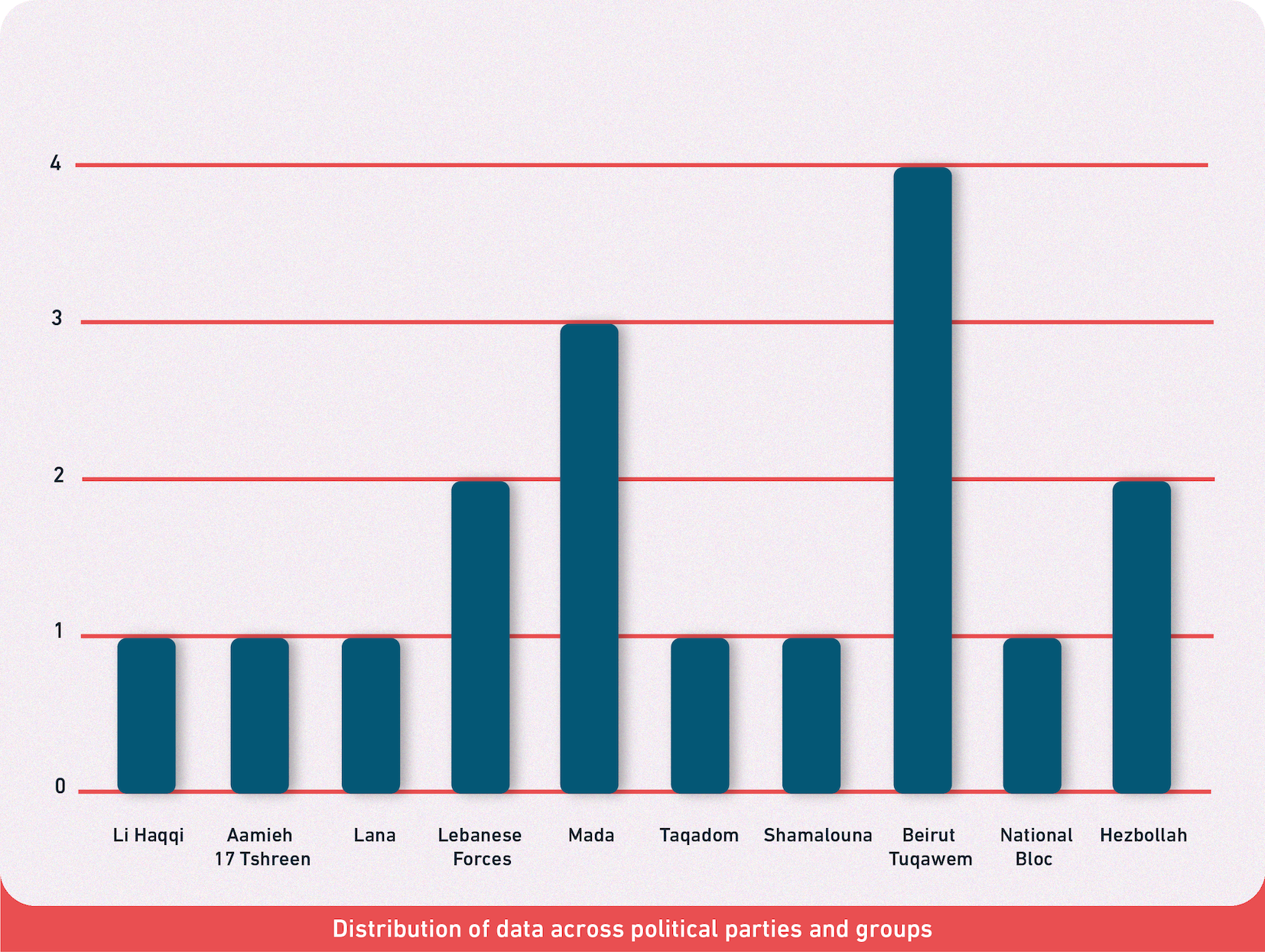
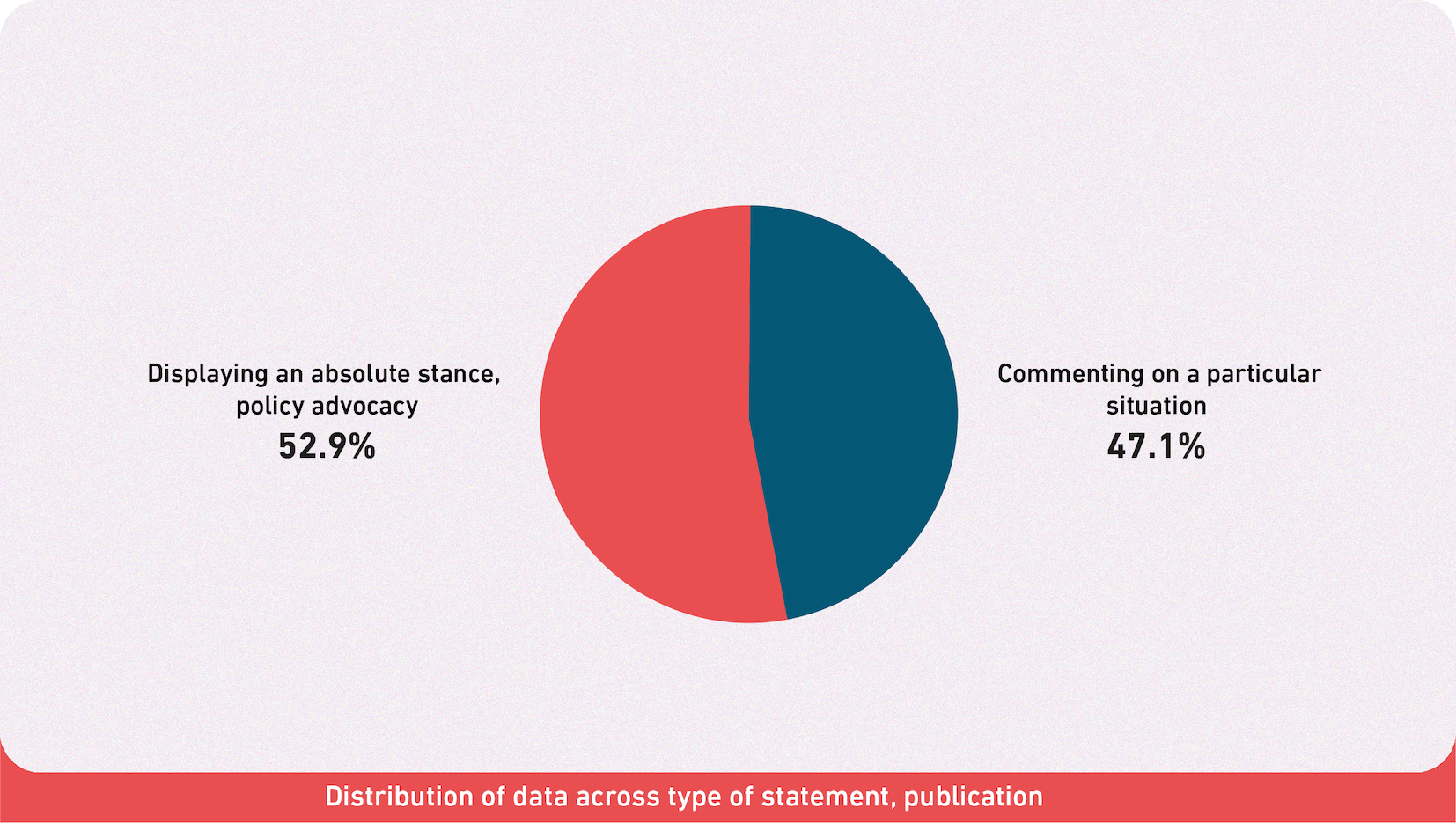
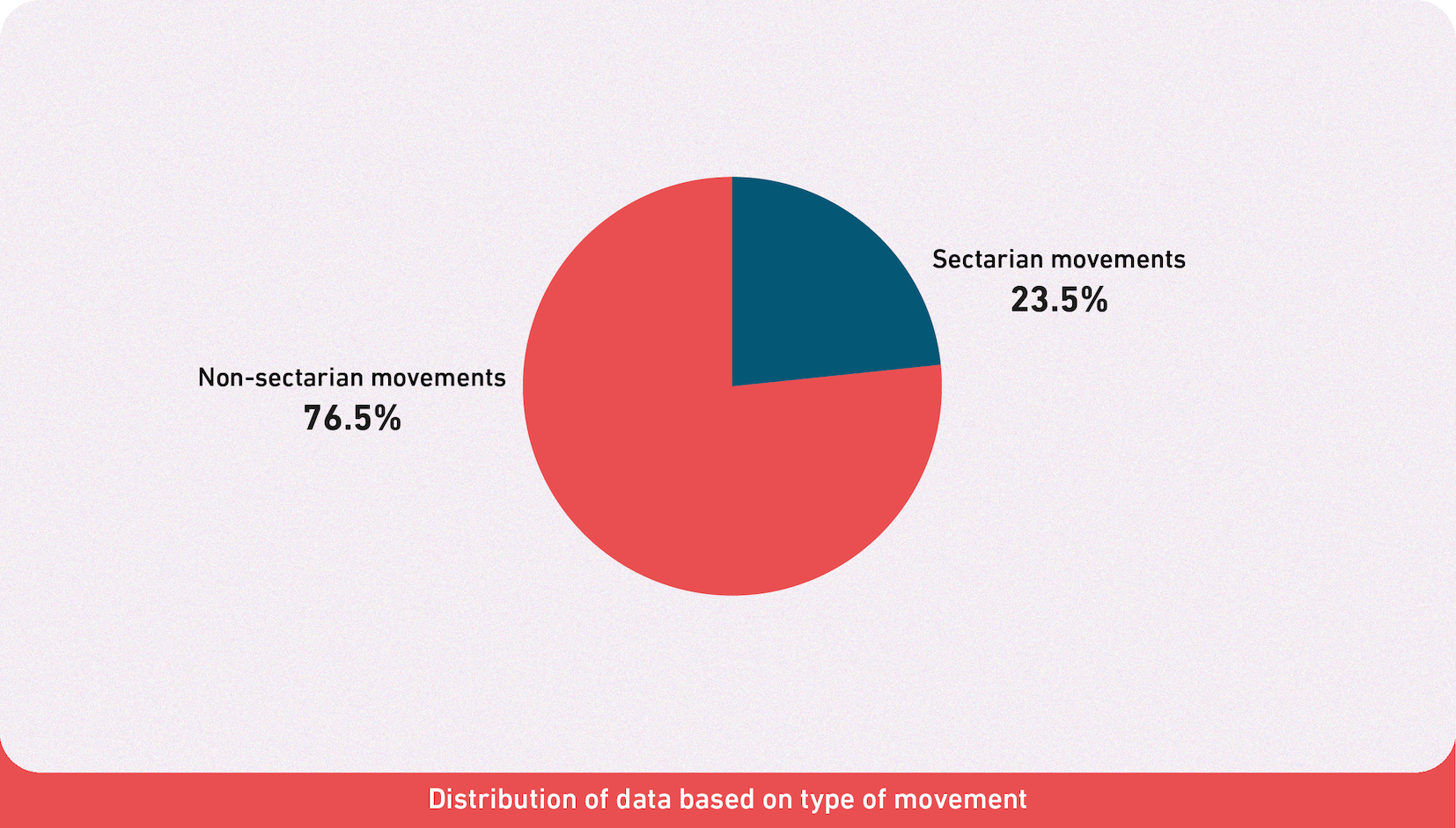
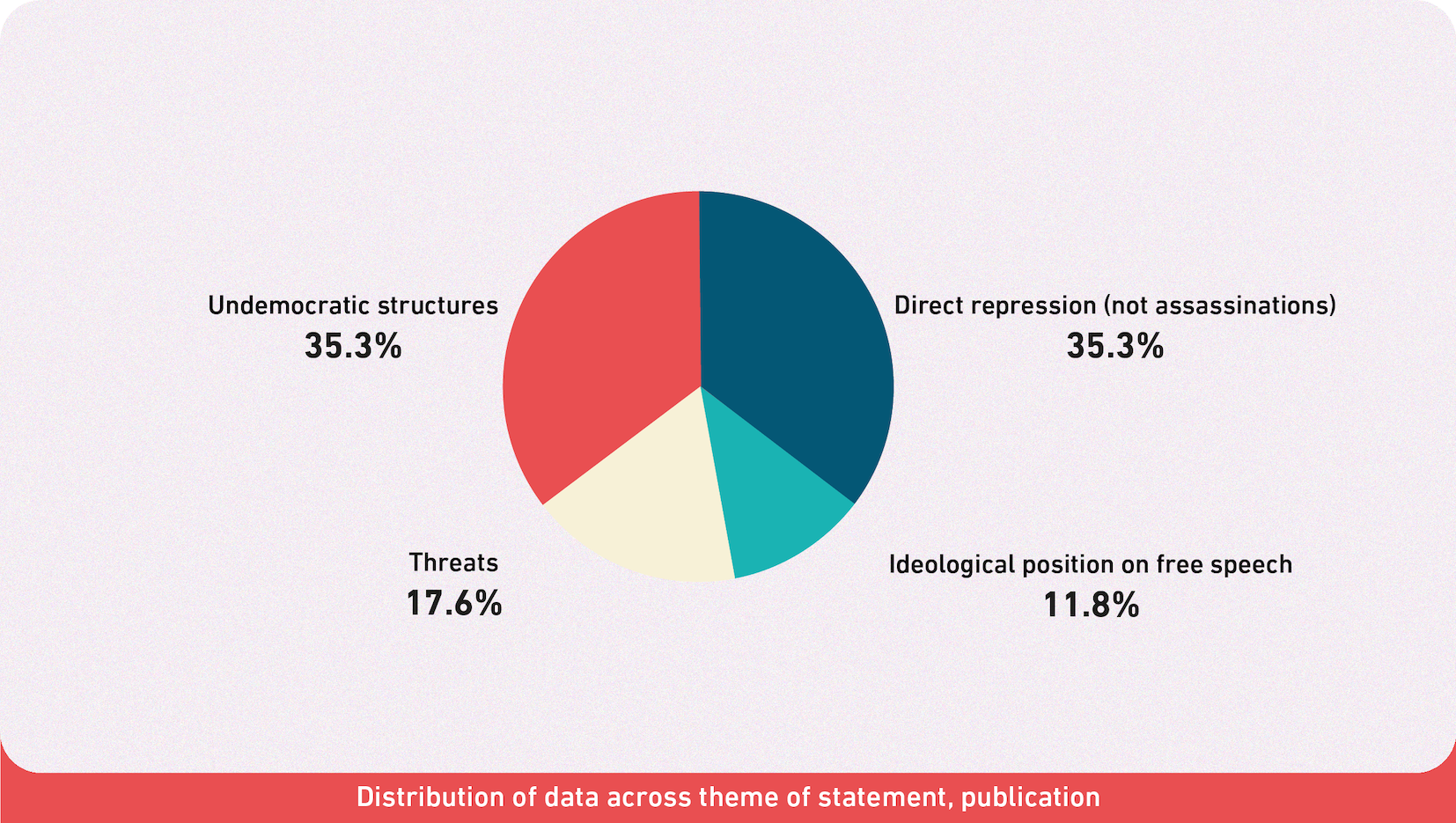
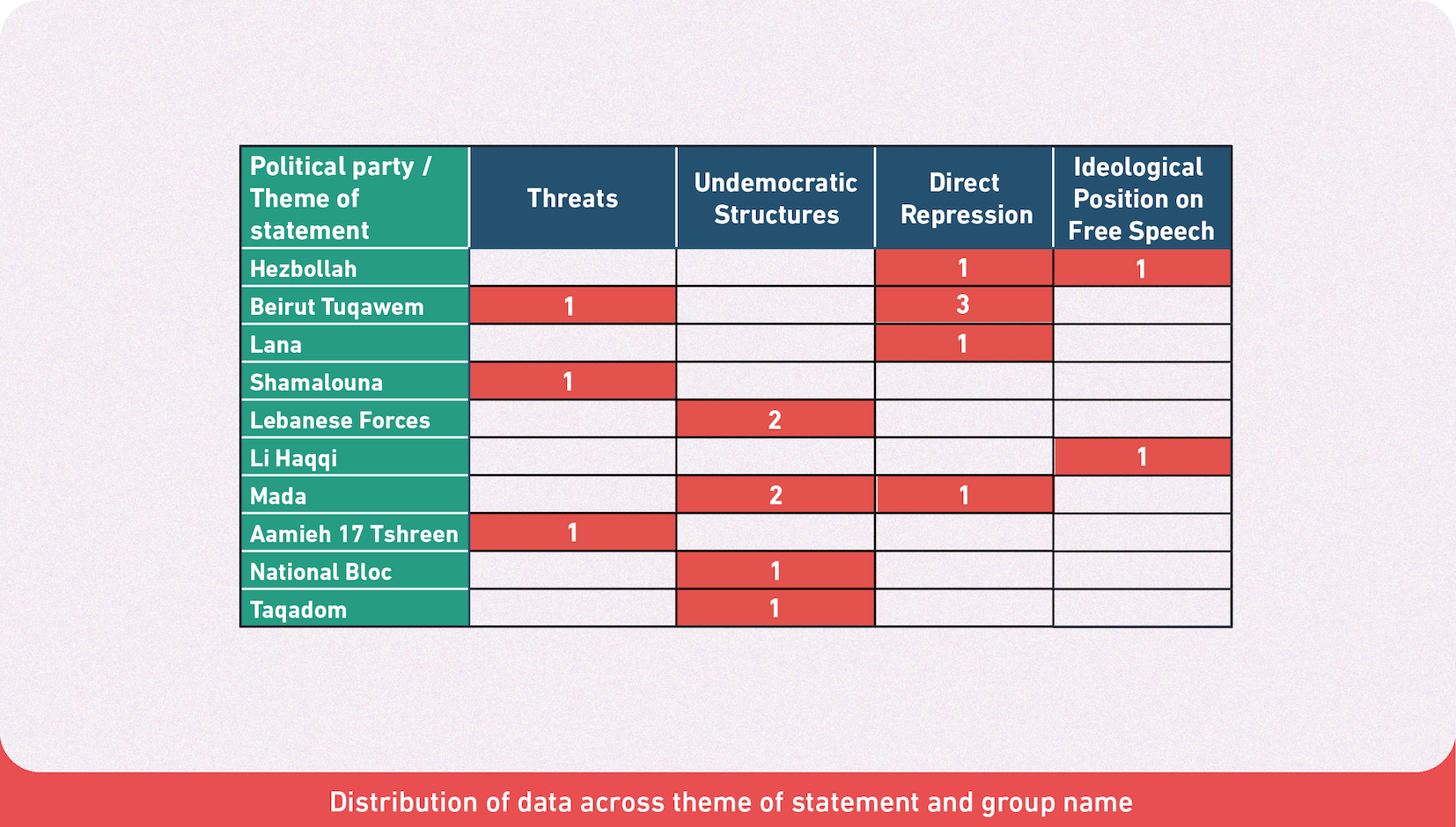
Analysis
In absolute terms, the data displayed suggests that statements critiquing Lebanon’s democratic deficiency, alongside those responding to direct forms of repression, make up the majority of content released by political parties, their leaders, and their candidates running for these elections. Similar to the last report released in March, which demonstrated a decent amount of statements focused primarily on policy advocacy, this month’s report suggests a continuation of this pattern.
Moreover, the percentage distribution of statements between sectarian and non-sectarian parties remains similar to that demonstrated in the former report, further supporting the hypothesis that non-sectarian movements in the Lebanese context are more inclined to tackle the question of free speech and democracy when compared to sectarian parties. It is also important to take into account that as the number of statements released by Christian-majority opposition parties – such as Kataeb and Lebanese Forces – decreased, the number of statements focused on assassinations and Hezbollah also decreased. This reflects the centrality of the issue of Hezbollah in the discourse of Kataeb and the Lebanese Forces on matters related to human rights and democratic processes.
Also, given the fact that a decent portion of the statements analyzed are situational (i.e., responding to a particular situation or violation), it is not a surprise that the Beirut Tuqawem electoral campaign released the highest number of statements relative to other entities. This particularly comes after Future Movement supporters assaulted members of the campaign and broke down their tent in Beirut’s Tariq Al-Jadida neighborhood, inducing the campaign to respond on its platforms and in the media. In the process, other groups released statements of solidarity in response to the incident.
Furthermore, the number of statements demonstrating the ideological or programmatic direction of alternative parties on free speech (2) significantly decreased when compared to last month’s report (7) but is anticipated to increase later on as official list programs circulate. Interestingly, one example of such statements is a Facebook post published by one of Hezbollah’s candidates Ibrahim Al-Mussawi, in which he highlighted the way his party treats concepts such as freedom of speech, i.e., a principle perceived as a “western” political package.
To access the entire raw date, as extracted from Twitter, click on the "Read full report" button below.
This report was made possible through support from the UN Democracy Fund.